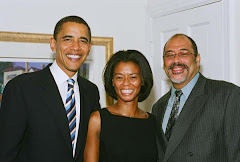"It just doesn’t add up.
Although more minority-owned firms register with Missouri and Illinois departments of transportation to compete for subcontracting jobs, the majority of that work goes to white women.
Statistics from MoDot show that there are 62 percent minority contractors and 38 percent women contractors certified with the department. Yet, minority firms get only 12 percent of the work and women-owned businesses get a whopping 88 percent.
“It is a façade,” said Hilary Ogunrinde, vice president of the United Truckers Alliance.
She said that though there are some “legitimate” companies owned by white women, “the statistics speak for themselves.”
“There are front companies,” Ogunrinde said. “Their brothers, other family members and friends are getting the work.”
Officials from the Missouri and Illinois departments of transportation held two public meetings this week to get public comment about a plan to separately classify minority-owned businesses and women-owned businesses when issuing government contracts.
Currently, the two groups are listed together as “disadvantaged business enterprises” or DBEs. If the two groups are separated, officials can have separate minority goals and women goals. The separate categories would be woman-owned business enterprises (WBEs) and minority business enterprises (MBEs).
Permission from the U.S. Department of Transportation and Federal Highway Administration is needed to separate the two goals and mandate an individual percentage of work for both groups. The departments of transportation are working with a national consultant to prepare a proposal, which includes a disparity study, to submit by August.
By federal law, each State must have a program in place that ensures minorities and women are given the percentage of work on projects that receive federal and state funding. But often, minorities are left out.
For example, in June, Fred Weber, a white-owned company, was hired by MoDot for a $4.4 million segment of the $640 million Mississippi River Bridge project. Of that amount, 18 percent of the work went to subcontractors that were classified as “disadvantaged business enterprises,” which means woman- or minority- owned.
Only one company was minority-owned, and talks have begun with another minority company, according to Marie Elliott, spokeswoman for MoDot.
“We are committed to ensuring there is minority participation on this project,” Elliott said. “There will be other opportunities.”
David Jackson, who works to connect minority contractors with prime contractors, said the proposal to divide the two groups is a welcomed concept.
He has attended public hearings regarding the Mississippi River Bridge project since they began early this year.
“The first one, I got upset because I asked what are they doing differently,” Jackson said. “But evidently, they thought about it and are heading in the right direction.”
Consultant Eleanor Mason Ramsey said if the separation is allowed, this will be the first time in history that a State transportation agency has voluntarily separated the DBE goals. “It is a very novel approach to ensure that everyone is represented,” Ramsey said.
Nine states on the West Coast were mandated by the circuit court to implement a similar change.
Yaphett El-Amin, executive director of MoKan, said the decision to separate the goals for Missouri is the result of pressure her organization and others have placed on MoDot.
Although El-Amin supports the separation of the two groups, her organization plans to contact the U.S. Department of Justice to investigate whether MoDot is in violation of the Civil Rights Act. El-Amin said her group will request that the flow of federal money to MoDot be halted until MoDot meets federal regulations regarding diversity.
“Is 88 percent and 12 percent leveling the playing field?” El-Amin asked. “It’s high time that the DBE/MBE program is not treated like a stepchild.”
MBE to DBE
Lester Woods, director of MoDot’s newly created external Civil Rights division, said the imbalance of participation among women- and minority-owned businesses is an issue nationwide.
In the past, federal regulation required a minority business enterprise goal (MBE). But in the early 1990s, legislation through Congress changed to require a disadvantaged business enterprise (DBE) goal, Woods said.
“History denotes that when it went from MBE to DBE, there was a push to eliminate the program overall,” he said. “But white women and minority companies worked together on a national level to keep the program.”
Now, it seems the two groups may be on opposite sides this time.
While all African Americans supported the division, one organization did not. Leonard Toenjes, president of The Associated General Contractors of America–St. Louis, said his organization supports the need for minority representation in the construction field. However, his organization is against the split. He said that is not the current law and it seems as if MoDot is rushing through the process to obtain the waiver from the federal government.
“We believe in the law of the land and we believe if due process is followed, everyone will be given a fair chance,” Toenjes said. “This is not the way to implement something like this, six weeks away from the award of the project.”
One white woman at the meeting was unsure.
“I don’t know how I feel bout the separation,” said Ann Schwetye, managing director of Building Works, who is white.
She did say that the construction business “has long excluded minority-owned businesses and women.”
Other white women were clear about their opposition but would only speak on condition of anonymity.
“It is not fair to have women against everyone else,” said a 42-year-old white woman who operates a trucking company. “We feel we are one and we should stay as one.”
Another white woman in the trucking business said separate goals didn’t work in the 1980s, “so what makes them think it will work now?
“It’s not fair,” she said.
A 27-year old white woman who owns a landscaping business added, “If they split women and minorities, what stops other groups from separating, like African Americans separated from Asians. Where does it stop?”
I-70 shutdown announcement
The African-American Business and Contractors Association will conduct a news conference 11 a.m. Thursday, July 9 to announce its plans to protest on Interstate 70 on Monday to highlight the continuing lack of inclusion of African-American contractors, suppliers, and trade persons on state, city and privately owned construction projects."
The above article has been published on this blog, courtesy of Dionne D. Peeples of St. Louis AmericanSt. Louis American
Eric E. Vickers
Attorney, Minority Inclusion Alliance
St. Louis Metropolitan.
Thursday, July 9, 2009
Subscribe to:
Post Comments (Atom)

,+W.+Bevis+Schock+and+James+Schottel,+Jr.+(seated)+claim+north-side+land+magnate+Paul+McKee+will+displace+residents+for+a+project+he+can%27t+possibly+pull+off..jpg)







No comments:
Post a Comment